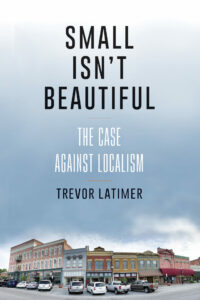Dubuque, IA. If there’s one single book most localists won’t read but should, it’s this one. Small Isn’t Beautiful: A Case Against Localism is a bracing challenge to people (like me) whose shelves are stocked mainly with localism’s friends. Trevor Latimer is not exactly its enemy; while his book is subtitled “the case against localism,” the case is more subtle than that. But he is certainly what they call a “worthy opponent,” and he deserves very careful attention.
Latimer’s case is not so much “against localism” as it is against the case that people have made for it so far. He argues that our arguments do not add up, that localism sounds good in theory but that the theory works badly. The book is much more than an academic exercise in fallacy-spotting, however. Latimer writes with real concern. He believes not only that the theory is logically flawed, but that the flaws do genuine harm because the theory is so influential. For him, “localism can be dangerous.”
This may surprise those of us who are accustomed to feeling anything but influential. Would that localism really were dangerous! From our perspective, the small and the beautiful are squeezed tighter every day between the rock of Big Government and the hard place of the Corporations. Last time I checked, Wendell Berry still hasn’t been named Secretary of Agriculture. And I’m willing to bet that the Secretary of Agriculture still hasn’t read any Wendell Berry.
But that is not exactly fair to Latimer, and Latimer himself is nothing if not fair in his treatment of localism. I will come back later to his claim that localism has too much influence, which merits more than a joke in response. Let me first offer a brief tour of the book’s arguments. Then I want to reflect a bit on one question in particular.
The tour will have to be brief, to be sure: this is a book dense with argument. Fortunately it is also free of jargon. Latimer writes plainly and simply, with rigor and clarity. The prose is maddeningly efficient, and no summary could do it justice. It would be much better to put down this review and order the book itself. If you do, you will encounter six different arguments for localism.
The “argument from tyranny” is that because centralization leads to despotism, and because localism is the opposite of centralization, localism defends us against tyranny. The “argument from belonging” is that localism is good because we need a sense of meaning and attachment, and these are found in the places where we live our daily lives, with our neighbors. The “argument from nature” is that there is a natural limit to the size and scope of a political community; bigness breeds political pathologies. The “argument from democracy” is that localism is good because it promotes democratic attitudes and facilitates democratic governance. The “argument from knowledge” is that important decisions require knowledge of particulars which can only be acquired on the ground, via experience, and which cannot be transmitted without loss to distant decision-makers. Finally, the “argument from efficiency” is that local government is more effective at the production, allocation, and/or redistribution of resources.
Except for the argument from “efficiency,” which is more technical and mainly the purview of economists, all these were very familiar to me before I read the book. I had read most of the writers he used as the sources of these arguments. I could not think of anything he left out. If he had done nothing more than collect and organize the theory in this way, Latimer would have done localists a good service.
But of course he has done more than that. The real “added value” is his exhaustive investigation of the assumptions and implications of each argument. Latimer is right to say that many of us localists have failed to articulate and grapple with them, and I am glad he has forced me to do so. And as a localist of the special stripe that might gather here at FPR (which does get a mention in the text), I am especially glad to grapple here with one of the questions he raises.
This is the very basic question about what exactly we FPR-types mean when we think and talk about “localism.” Latimer himself is extremely careful to define his terms and to use them consistently. For him, localism is “the belief or claim that we should prioritize the local by making decisions, exercising authority, or implementing policy locally or more locally.” I have no reason to contest this definition, but Latimer made me realize that in practice I use the term more loosely, and that the connotations it has perhaps acquired in our little corner of the conversation might be in some tension with any definition like this, which makes localism a claim about where decisions should be made. I wonder how much, wittingly or not, we tend instead to approach “localism” primarily as a claim about what decisions should be made.
This, of course, is not a new problem. It is hard to be a principled localist. Most of us are localists when local authorities make decisions we like. When they become “tyrants,” we fantasize about calling some higher-up who will put them in their place. It is not a new problem, but it became newly vivid to me during the pandemic. It is no surprise that Latimer cites this as the perfect example of localism’s principle-free, cross-partisan appeal. Some cities had mask or vaccine mandates, but the state government banned them. Some states had mask or vaccine mandates, but counties refused to enforce them. I myself live in a city that had one policy, in a state that had another. I had my views on the matter, and my views were certainly in tension with my city. And I must admit that my opinion about the issue weighed more in the balance than my opinion about where the issue should be decided. So it was with most people. Liberals were localists in conservative states; conservatives were localists in liberal states.
Latimer insists that if localism has any meaning, it has it as a theory of government. Localism is an answer to the question of institutional design. It is about jurisdiction. But this is a practical question; it’s a question about what works, about what will facilitate human flourishing in particular circumstances. He is happy to say that more local governance might be a good answer in some cases and a bad answer in other cases. His objection is to an ideological presumption that it is always the better answer. His problem is not with “the local” or with doing things more locally, but with localism. Localism survives by playing up benefits and discounting costs. And he thinks a fuller accounting shows that as a theory of institutional design, one which in his view has been applied and therefore tested extensively, localism comes up short more often than not.
I did not notice Latimer say this explicitly, but he made me wonder if localism’s ideological flexibility (to put it nicely) actually makes it easier for us localists to avoid this reckoning. Of course it should have the opposite effect. The fact that two people with opposing views on the issues can both be localists should show us that localism, whatever its merits, is not about those issues themselves. But it does not seem to work like this. Instead we often equate localism, which is ostensibly a claim about the proper size and shape of the container, with our convictions about the container’s proper contents. We tend to smuggle our opinions about what should be decided into our statements about who should decide.
Consider that here at FPR we are at least as concerned with cultural issues as with political ones. If we are being honest, many of us are probably more concerned with the former than with the latter. That is certainly true for me. And maybe it is not even about what “concerns” us, so much as it is about what interests us. I read a lot more fiction than political science (and I’m a political science professor!). Laurus is amazing. Tax policy is boring.
Perhaps one of our guiding assumptions is that if decision-making were more local, the decisions would naturally be of a certain flavor. We can easily see and admit that this does not logically follow. The pandemic is only one of many examples that force us to do so. But I think we might nevertheless maintain some more or less vague sense that our cultural betes noir are conceptually linked to E. F. Schumacher’s “idolatry of gigantism.” It is hard for me to imagine a localist who is also a transhumanist, for example.
No doubt that is because in the real world the transhumanists are also globalists. The association is real. But is it necessary? I think it probably is, actually. I think there is something like a logical entailment. But—and this is the point—I have never bothered to make that case. And I probably have all kinds of associations like this in mind when I call myself a “localist.” How many of them would hold up to examination? How much of my localism is about jurisdictions, and how much of it is about judgments, and how do these relate?
Latimer is pretty clearly a liberal, not in the partisan sense but in the sense that he believes government institutions are mechanisms for resolving disagreement, or for preventing disagreement from flaring up into violence. He starts not with a vision of “the good” and the idea that the purpose of the political community is to pursue it , but with the social fact that people have conflicting visions of the good, and the idea that the purpose of the political community is to facilitate each person’s pursuit by respecting liberties and protecting rights. Local governance is good to the extent it serves this purpose; bad to the extent it thwarts it. Latimer thinks that these days it more frequently thwarts it, and that the purpose would often be better achieved by more centralization, not less. Higher levels of government can often do more to facilitate human flourishing, understood in this liberal way, than lower ones. The example of school desegregation, in which localism stood for the defense of certain local judgments (racist ones) against individual rights, and the higher jurisdiction stood for the protection of those rights against those judgments, serves his argument well here. What do localists do when the locals are wrong? Do we tend to put off this question by focusing on the wrongs of the feds, and conflating “local” with “right”?
Latimer wants us to see that this is why we have to stick to the question of institutional design, and why we have be pragmatic rather than dogmatic. What arrangements will help us deal with locals gone wrong? Surely something involving higher jurisdictions. What arrangements will help us deal with feds gone wrong? No doubt something involving lower jurisdictions. There will be horizontal solutions as well; checks within levels of government, as well as checks between them. But now we are not talking about localism, not if that means a presumption in favor of local decision-making. We are talking about Madison and Hamilton and the Federalist Papers. Humdrum liberal stuff.
How much of our “localism,” by contrast, is energized not by an alternative, anti-federalist theory of jurisdiction, but by an alternative vision of the good life, and more especially by our sense that the viability of this vision is increasingly threatened by a theory of jurisdiction which cloaks its own rival vision in liberal rhetoric about “not imposing our values on one another”? Put differently: to what extent are we localists, and to what extent are we postliberals, and to what extent are these positions compatible?
Maybe this is why we respond with disbelief when Latimer says that “localism is on the march.” If what we mean by “localism” is actually more about contents than container, more a matter of judgments than jurisdiction, more concerned with certain ways of life than with certain procedures, then “localism” is clearly on the back foot. And it is at this point that I think Latimer, like any worthy opponent, can help us to formulate a question that we might not have thought to ask ourselves. Suppose he is right that localism as a theory of jurisdiction really is “on the march.” This makes me wonder if localism in that sense (which for him is its only logical sense) might sometimes be more of a threat to our cultural concerns than we appreciate. If our fundamental aim is to preserve or advance a certain vision of the good life, a certain conception of human flourishing, are there any situations in which our general preference for local decision-making might actually stand in our way?
I do not have in mind those obvious examples, like the pandemic, where sticking with the letter of our localist principles means losing a contest of judgments. I am thinking of something more complicated.
I am thinking of the uncomfortable question about the extent to which the local—even those places where the people share our views—remains the repository of the values we have in mind. Suppose we are right and there really is some kind of “natural” connection between those values and localness. Isn’t “nature,” human and otherwise, precisely what the Machine is so effectively destroying? How much of it is left? Are people in the country and the small towns any less beholden to Amazon, less addicted to devices, less addled by social media? Yes, their opinions about hot-button topics are more likely to be on one side of the spectrum than another. And that matters; I do not want to suggest otherwise. But I do not think these opinions are really the stuff of that alternative vision of the good which is associated in my own mind, coherently or incoherently, with “localism.” Regardless of their poll-ready opinions, what is their way of life? (What is mine, for that matter?)
This question is uncomfortable because if “the local” is no longer where our vision of human flourishing lives, then protecting and strengthening the local may not be the best way to pursue it. At least not always or necessarily. (This is quite aside from the additional question of whether the local was ever that place, and if so, when and where. Our kind of localist always faces the danger of nostalgia. Paul Kingsnorth writes beautifully about this in one of his most recent essays.)
More insidiously, there is the possibility that in this brave new world, where whatever the local may have contained has long since drained out, rhetorical appeals to localism might serve the Machine just as well as any of those old-fashioned paeans to bigness to which many of us are so allergic. Better, even: since we are so sensitive to any hint of Big Brother, Big Brother is likely to adapt his strategy. Probably there are forms of “localism” well-suited to sneaking Machine values under the radar of the Machine’s enemies. Will we be able to spot them?
I am not making an argument here. I am making a plea for more careful and perhaps more systematic thinking about the kinds of arguments we make. And I am pleading with myself as much as with others; as a political theorist this kind of thinking is in fact “my job,” but I have not really done it. In particular, I think that we (I) need to pay more attention to the nitty-gritty problems of institutional design than we are wont to do. We (I) need to take more of an interest in these problems. We should think harder about how to connect our underdeveloped views about jurisdictional issues with our overdeveloped views about “the issues,” and we should be willing to change our minds about one or the other or both. Latimer’s excellent book is a good place to start this work.
Image via Flickr: Gale Stockwell, “Parkville, Main Street” (1934).






10 comments
Joanna Brown
I enjoyed reading Small Isn’t Beautiful: A Case Against Localism. It challenges people to think about how their arguments for localism might not work in practice. Trevor Latimer is a worthy opponent and I look forward to his next book.
Kevin Hadley
I love everything Adam Smith puts on FPR. I’m looking forward to him writing up the results of the thinking he has say that we (he) should do.
Brian
Why should “localists” have to defend our position? We have absolutely zero power and influence. Ask the defenders of “biggism” or whatever the default system we have today to justify themselves. Who thinks a system of obliterated small town downtowns, sprawling suburbs, endless stripmalls, small town governments and schools being wards of their states, massive government subsidies given to large corporations, no economic activity but chains, big box stores and the internet is some sort of ideal system?
(“Localism means segregation” is an “argument” too stupid to be taken seriously, it’s meant in bad faith and has no reason to be entertained.)
Localism is going to win not because of any intellectual argument but because the current system is doomed, whether you think that’s because of economic or environmental or whatever other reasons. We should be pushing against it in every way we can, while tending to our local communities and preparing.
Zach Boston
Excellent article! The institutional/practical vs. philosophical/theoretical problem has always vexed me, mainly because the theoretical comes much more easily to me given that I’m the opposite of detail-oriented. I have let and will always let the concrete policy side of things be left to people far more intelligent and wise than I am.
As far as the ideological issue raised goes, I actually often hesitate to describe myself as a localist because that’s not what I am, per se. But most people would have no idea what I mean if I call myself a subsidiarist, so localist it is. Honestly, I think some of the wind can be taken out of our opponents’ sails, at least as far as concerns over being dogmatically ideological go, if we could emphasize the principle of subsidiarity. This principle is explicitly anti-ideological. It inherently expresses bias toward the local while recognizing that there are many cases where bigger organizations/powers are needed. It seeks to establish a paradigm of dealing with issues at the smallest, most local level *possible* for a given situation. I like how the American Solidarity Party puts it: seeking governance as small as possible but as big as necessary. Indeed, distributism is the principle of subsidiarity applied to economics.
In theory, at least, our current Federalist system could provide the perfect infrastructure for a subsidiarist way of governing. But between certain systems that inherently favor centralization and our cultural attitude that is enthralled with the “idolatry of gigantism” our Federalist system becomes explicitly anti-subsidiarist.
But the biggest problem in establishing any localist/subsidiarist regime is simply the scale of modern life, especially modern society. It’s much harder to govern this way in a country of a few hundred million than in, say, an early American town or a Medieval land with a King over a few thousand subjects. E.F. Schumacher is right to say that small is beautiful. Wilhelm Röpke is right to rant against “mass man”. Localists are right in all their arguments for smallness that you alluded to. We never should have gone down this road to bigness and centralization. But now that we’re here, we have to realize we may not be able to undo what has been done.
I hope folks much wiser than I can figure out how to tackle these unique challenges given our historically unique scale of doings, and maybe find a way to bring us down to earth. But even if we can’t, Localism/Subsidiarity is still right in its critiques and even if that’s all it can do, I think it useful. It is good to be able to keep society from going off a cliff, to challenge what truly IS wrong, and to give folks an alternative should they choose to “opt out”, even if we can’t get society to where it ought to be.
Martin
What I mean about “alternating” is recognizing that dichotomies exist in ordinary life all day long. At some moments, we might feel sentimental and moved to express feelings, while at others we are rigid and suppress feelings. Or we might be sociable at some times of day, and prefer solitude at other times of day.
Rob G
Lots to chew on here. I’d note that FPR-type localism is generally tied to agrarian ideas (including but not limited to agriculture, i.e., the importance of land/place), which also tend to involve some version of the principle of subsidiarity. Is it possible that a critique of localism that doesn’t address the unity of these things, but instead views localism in isolation, is looking at an incomplete picture? Or to put it another way, is Latimer’s definition perhaps too narrow?
Russell Arben Fox
Is it possible that a critique of localism that doesn’t address the unity of these things, but instead views localism in isolation, is looking at an incomplete picture?
Rob, I think you’re correct–though I would note that bringing up agrarianism as a philosophical framework for assessing just what localism is supposed to do or be about is, I think, as relevant to Smith’s comments on Latimer as it is to Latimer’s book itself. Check out my companion review tomorrow, and see if you agree!
Rob G
Yes, I think you have a point, and will definitely read your review. My (unmentioned) hunch was that Adam possibly didn’t include it because Latimer didn’t. But being a Berry reader for 25 years tends to preclude one’s separation of the two. 😉
Adam Smith
Yes, Latimer isn’t really thinking about agrarianism. He mentions Berry once or twice, just to quote him as a representative of localism, but doesn’t talk about agrarianism itself. He does talk about subsidiarity. But his whole argument very much depends, logically, on the narrow definition of localism he provides (which both Russell and I quote).
Martin
Good essay, Adam. You dance around a dichotomy, but don’t suggest that it might take the form of a see-saw, where sides can be alternated. You do mention that Latimer says localism is good at some things, centrism at others, but you don’t give enough examples amidst the ruminating. So are your ruminations mostly abstract?
Your point about content and container is excellent. I was hoping you’d go more deeply into the “on the march” vs “on the back foot” of Porcher-favored content.
As for Kingsnorth, I read his essay about nostalgia and “the great fall” a couple weeks ago. It’s good, but gloomy, reminiscent of “the end is nigh” doomsayers. Buddhism teaches detachment about mind-stuff, like predictions of an inevitable “logical conclusion”, not only detachment when dealing with sudden change. So I don’t see his advice to “watch it fall” as truly Buddhist.
But the biggest flaw in his essay is assuming that Cavafy’s poem (made into a song by Leonard Cohen: https://www.youtube.com/watch?v=ELGaHaZzwjU) is an accurate reflection of Marc Anthony’s experience. If you read what Plutarch says about the fall of Alexandria in his chapters on Anthony, it’s pretty clear that Anthony’s decline had “clues” years in advance. So his alleged dream is like the last chapter of a novel, not some kind of foreshadowing in a short story.
Comments are closed.